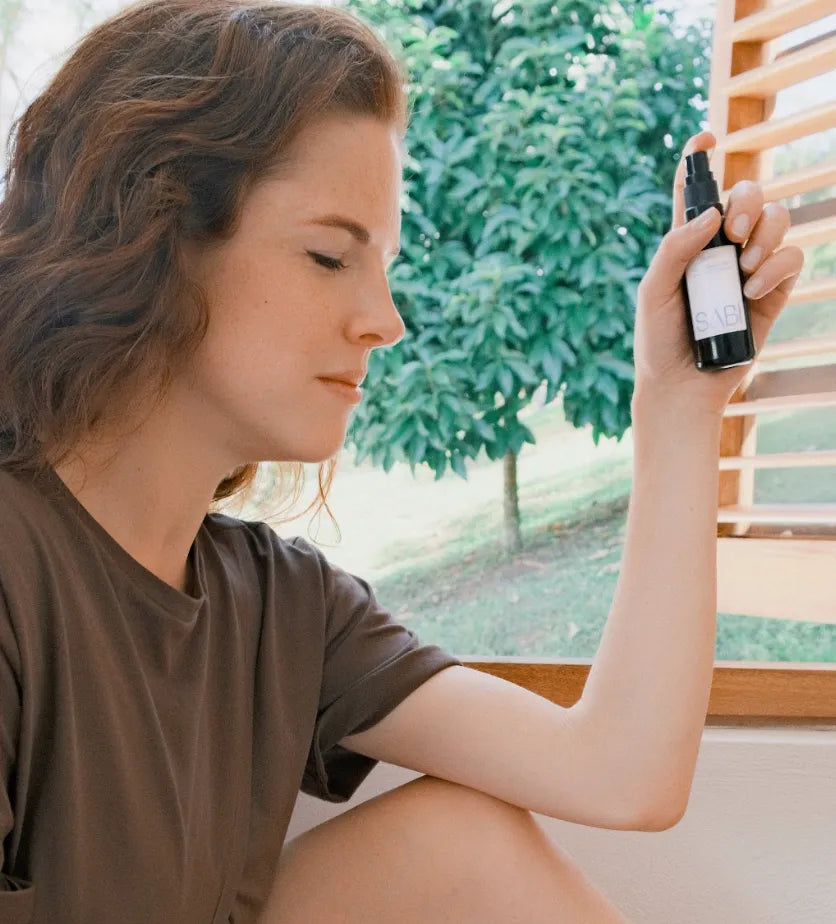Hi, I’m Anna. There’s a unique kind of frustration that comes with feeling like your body and skin are changing faster than you can keep up. I remember the whirlwind after having my son—not just the sleepless nights and hormonal shifts, but the way my skin seemed to reflect everything I was going through. It felt dry, dull, and somehow foreign, like it no longer belonged to me.
Menopause can bring that same unsettling feeling—a sense of losing touch with your own body. But what I’ve learned through my personal journey, and through building The SABI with Hilary, is that these changes are an invitation. They’re an opportunity to reconnect with yourself, to nourish your body, and to treat your skin with the care it deserves.
At The SABI, we’re committed to helping you navigate this journey with tools and knowledge that empower you to feel at home in your skin again. Whether it’s understanding the role of hormones, finding products that truly work, or simply knowing you’re not alone, we’re here for you every step of the way.
The Impact of Menopause on Skin
Menopause is a profound phase of change, not only for your body but also for your skin. With declining estrogen levels, you may notice:
-
Thinner, Less Elastic Skin: Estrogen stimulates collagen production. Its decline can make skin feel looser and more prone to fine lines.
-
Increased Dryness: The natural moisture barrier weakens, leading to dullness and dehydration.
-
Heightened Sensitivity: Fluctuations in hormones can make skin more reactive, emphasizing the need for gentle care.
How to Support Your Skin Before and After Menopause
1. Hydration is Key
As skin loses its ability to retain moisture, replenishing hydration is essential:
-
Use Hydrating Mists: Our Reviving All Natural Adaptogenic Face Mist is crafted with hydrating botanicals like aloe vera and rose water to refresh and restore moisture throughout the day.
-
Include Water-Rich Foods: Think cucumbers, watermelon, and leafy greens to hydrate from within.
-
Layer Your Skincare: Pair a face mist with a nourishing moisturizer to lock in hydration.
2. Nourish Skin with the Right Nutrients
Your skin needs more support as it adapts to hormonal changes:
-
Collagen-Boosting Foods: Include vitamin C-rich options like citrus fruits and berries, which help your body produce collagen naturally.
-
Omega-3 Fatty Acids: Found in fish like salmon or flaxseeds, these fats strengthen your skin barrier.
-
Topical Antioxidants: Use serums with vitamins E and C to combat oxidative stress that accelerates aging.
3. Hormonal Balance and Skin Health
Maintaining balance helps your skin adapt to these transitions:
-
Gentle Exercise: Regular movement can lower cortisol levels, which helps mitigate stress-induced skin dryness.
-
Mindful Sleep Practices: Proper rest supports hormone regulation and aids your skin’s repair process.
-
Soothing Skincare: Incorporate calming products like the Reviving All Natural Adaptogenic Face Mist, designed to gently hydrate and refresh, even on sensitive, post-menopausal skin.
4. Protect and Repair
With skin becoming more delicate, it’s important to shield and nourish it daily:
-
Always Use Sunscreen: Protect against UV rays, which accelerate collagen loss.
-
Avoid Harsh Cleansers: Opt for pH-balanced, sulfate-free options to prevent over-drying.
-
Repair While You Sleep: Use a nourishing night cream to support skin regeneration.
A New Phase, A New Routine
Menopause is a natural transition, and with it comes the chance to embrace a skincare routine that honors these changes. Products like our Reviving All Natural Adaptogenic Face Mist can play a key role in replenishing hydration and maintaining that plump, healthy glow.
Your skin deserves care that evolves with you, supporting its strength and vitality before, during, and after menopause.
References
-
Verdier-Sevrain, S., et al. (2006). "Skin hydration: A review on its molecular mechanisms." Journal of Cosmetic Dermatology, 6(2), 75-82.
-
Brincat, M. (2000). "Hormone Replacement Therapy and the Skin." Maturitas, 35(2), 107-117.
-
Thornton, M. J. (2002). "Estrogens and aging skin." Dermato-Endocrinology, 1(4), 179-187.
-
Lupo, M. P., & Cole, A. L. (2007). "Cosmeceutical peptides." Clinics in Dermatology, 25(6), 593-596.
















